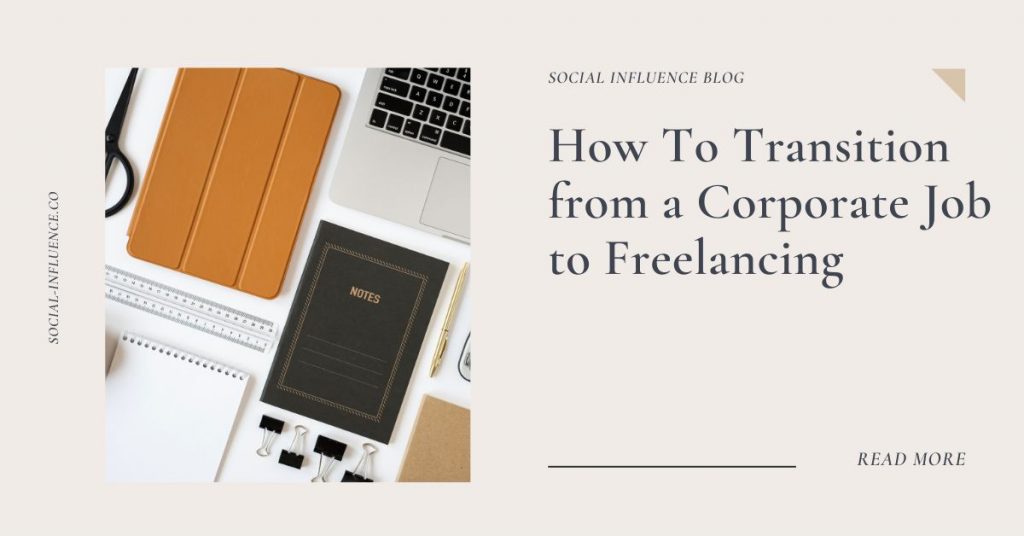|
Getting your Trinity Audio player ready...
|
Have you been considering switching from corporate life to freelancing? As someone who has been in your shoes before, I know how big of a decision this can be. Freelancing or entrepreneurship might be a great idea if you want to have more control over your career path and earn more. That’s right, you read it correctly. Entrepreneurship allows you to make as much money as you would as an employee, if not more.
For me, it was a rewarding and enjoyable decision. Having moved to a new country where I don’t speak the language, I knew it would be difficult to find a marketing role in the corporate world. Plus I have always dreamed of starting my own business. I just didn’t have to courage to do so. Looking back, there are some things I wish I’d done even before moving to Germany.
In this article, I hope to share with you these learnings, so that your transition from a corporate job to freelancing will be as smooth as possible:
Work on your business plan
Having a business plan for your freelance business is essential before you decide to go full-time. But don’t be scared, there is no need for something formal here. You only need to draft a few pages outlining the type of work, goals, budget, and timeframe. Having something concrete to refer back to will be helpful when challenges arise later in your freelance career.
To start with, coming up with an idea of what kind of work you want to do as a freelancer is the most important step. For example, if you enjoy writing, you can consider copywriting or content management jobs. If your background is in a specialized field like energy, exploring an energy job search platform can be an excellent way to discover freelance opportunities tailored to your expertise.
Once you have an idea of what type of work interests you most, start looking into how much these types of jobs pay and how much time they require on average. This will help you determine your prices.
Start part-time
You may be tempted to jump right out of your corporate job when you have a business idea. But this is a big decision, and you should take some time to think about it.
If possible, start freelancing part-time while still working at your corporate job. This will help you get used to working for yourself before quitting your day job completely and moving forward with full-time freelancing work. It also gives you time to build up savings so that when you are ready to quit your day job, you won’t have any financial worries while starting your self-employment journey.
Prep your finances
Preparing your finances will help you a great deal during the transition from your corporate job to freelancing. Once you are out of the corporate bubble, you will have to be self-sufficient. So you’ll need to find ways to save money and earn extra income.
You might want to consider changing your lifestyle and spending habits, too. For example, if you’re used to getting your coffee from Starbucks every day, then consider making your own coffee instead. Or it may be a good idea to stop the monthly subscriptions that you don’t use.
Have a skill and brand lined up
It’s not enough to just have a passion for your work. You need clients who want it too. And it will be your job to make yourself and your business look professional and sexy in front of potential clients.
To find out what skills are in demand, you can search freelance websites like Upwork, Guru, and Freelancer. If you’re looking for more traditional jobs, use sites like LinkedIn and Indeed to search by industry or location.
As a next step, take online courses. Learn how to market a business, email marketing, customer acquisition, soft skills and more using websites like Udemy or LinkedIn Learning.
Having always worked in the digital marketing field, I was confident enough to build up my brand and serve clients. However, I needed to learn more about entrepreneurship and client management.
Make sure you have enough savings
The good news is that most freelancers are self-employed and therefore aren’t required by law to contribute to social security or medicare taxes. The bad news is that freelancers still need money for taxes and health insurance.
If you want to freelance full-time, you’ll need enough savings to get you through the first few months without income. This might mean cutting back on expenses until you’re making enough money from your side hustle to cover them again.
Build up your portfolio before leaving your job
If you’re going into freelancing with little or no experience, create a portfolio of samples of your work so potential clients can see what you can do. This will help clients understand how you’d fit into their business model and help reel them in when they see what kind of work you can do for them!
When I started my business, I worked with a couple of entrepreneurs for free to acquire their feedback on my work. It was an opportunity for me to build up my portfolio too.
Having a solid portfolio will help build confidence when interviewing potential clients who aren’t familiar with your work history or skill set. And it can also help land those interviews in the first place!
Prepare yourself for a lonely journey
One of the strange things about the transition from a corporate job to freelancing is how much time you will likely spend alone. A job as a freelancer can leave you feeling distant at times. That might sound strange, but it’s true. When you work on a team, you have others to talk to, a common rest period, etc. As a freelancer, you’re working solo, and only interacting with your clients and co-workers when necessary.
Conclusion
It’s the dream of so many: to leave a long-time day job and finally pursue their passion. Whether that be blogging, freelance writing, selling some new product or service, or whatever it is. And for some people, it’s truly that simple: they want something new in their lives and are ready to go after it in full force.
Ultimately, freelancing offers more control over your work experience. It gives you the opportunity to build your business on your own time and lets you decide on which projects to take. But as with any new venture, it takes time to hone your talent and gain a solid base of clients. Be sure that freelancing is right for you before making the leap. I hope this article gave you valuable tips for switching from a corporate job to freelancing and put you on the road to success!






